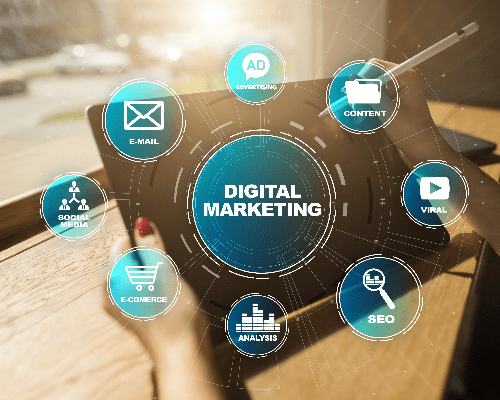If you’re looking to grow your business and reach more customers, understanding and implementing effective digital marketing strategies is the key to success. In this information-packed blog post, we’ll discuss how to craft a winning digital marketing strategy. The essential components to consider, and methods to measure and track success. We’ll also explore emerging trends and technologies that can keep you ahead of the competition. Showcase real-life case studies of companies that achieved remarkable results with their digital marketing strategies.
Key Takeaways
Craft a winning digital marketing strategy by setting clear objectives, identifying the target audience, and utilizing effective tactics.
Integrate content marketing, SEO, social media & email into your strategy for optimal reach and customer engagement.
Track success through analytics tools & KPIs to ensure informed decisions are made that align with business goals.
Crafting a Winning Digital Marketing Strategy

In the current digital age, creating a successful digital marketing strategy is key for businesses to flourish and differentiate themselves from their competitors. This can be achieved by delineating clear objectives, pinpointing your target audience, and opting for the most result-oriented digital marketing tactics to reach them through a well-planned digital marketing campaign.
But how do you go about crafting this winning strategy?
Set Clear Objectives
The foundation of any successful marketing strategy is setting SMART goals:
Specific
Measurable
Attainable
Relevant
Timely
These objectives help align your marketing efforts with your business goals. Ensuring that your digital strategies contribute to the overall success of your organization.
Clear objectives allow for a more efficient planning of your digital marketing campaigns and resource allocation to reach these goals.
Identify Your Target Audience
It’s pivotal to understand your target audience for designing marketing campaigns that resonate with potential customers. By understanding their demographics, preferences, and challenges, you can customize your marketing messages to address their unique needs and concerns.
One effective way to achieve this is by formulating comprehensive buyer personas, which are fictional representations of your ideal customers. These personas help guide your marketing efforts and ensure that your content speaks directly to your audience’s interests and challenges.

Choose the Right Channels
With your objectives and target audience in place, the next step is to select the most appropriate digital channels to reach them. These channels can include:
Organic search
Social media
Email marketing
Paid ads
The right mix of channels will depend on your specific audience, industry, and goals.
For instance, if your target audience frequently uses social media platforms, investing in social media marketing may be a priority. Opting for suitable channels guarantees that your digital marketing efforts yield the best results and effectively reach your target audience.
Essential Components of an Effective Digital Marketing Strategy

While the overarching digital marketing strategy guides your efforts, there are key elements that contribute to its success. These essential components include:
Content marketing
Search engine optimization (SEO)
Social media marketing
Email marketing
Integrating these elements into a cohesive and well-structured strategy allows you to optimize your reach and engage more effectively with potential customers.
Content Marketing
Content marketing is a powerful tool that focuses on providing valuable, engaging content to address users’ queries rather than disrupting them with unsolicited promotions. By creating helpful and relevant content, you can attract and retain customers, build trust, and drive action. Content marketing can take various forms, including blog posts, videos, ebooks, and webinars.
Effective content marketing can deepen your connection with your audience and establish your brand as a leader in your industry.
Search Engine Optimization (SEO)
Search Engine Optimization (SEO) is a process of optimizing your website and its content to improve its ranking on search engine results pages (SERPs). The goal of an effective SEO strategy is to increase organic traffic to your website by making it more visible to potential customers. By implementing a well-planned SEO strategy, your website can rank higher on SERPs, which can lead to an increase in traffic and more potential customers.
Targeting pertinent keywords and optimizing your content makes your website easily accessible to users seeking information related to your offerings.
Social Media Marketing

Social media marketing is a strategic approach to creating content and engaging with users on various social media platforms, such as:
Facebook
Twitter
Instagram
LinkedIn
Utilizing these platforms can increase your brand’s visibility, generate potential leads, and build strong relationships with your audience.
A successful social media marketing campaign involves posting engaging content, interacting with users, and monitoring metrics to measure performance and adjust your strategy accordingly.
Email Marketing
Email marketing is the process of sending out promotional emails to potential customers in order to advertise products and services. Leveraging email campaigns allows for lead nurturing, relationship building, and conversion driving.
Email marketing allows you to:
Tailor your messages to specific segments of your audience, ensuring that your content is relevant and engaging
Track key metrics such as open rates, click-through rates, and conversion rates
Monitor the effectiveness of your email marketing campaigns
Make data-driven decisions to optimize your strategy
Measuring and Tracking Success

To ensure the success of your digital marketing strategy, it is essential to measure and track its performance. Utilizing analytics tools, monitoring key performance indicators (KPIs), and optimizing conversion rates allows for an evaluation of your digital marketing efforts’ effectiveness and making data-driven improvements to your strategy.
In the following sections, we’ll delve into these methods and discuss how they can help you assess the success of your digital marketing campaigns.
Analytics Tools
Tools like Google Analytics can help you track website traffic, user behavior, and campaign performance, providing valuable insights into the success of your digital marketing efforts. By analyzing data from your website and apps, you can identify trends, patterns, and areas for improvement.
This information aids in making educated strategic decisions, ensuring effective resource allocation and desired results achievement.
Key Performance Indicators (KPIs)
Key Performance Indicators (KPIs) are essential for assessing the success of your digital marketing efforts and making data-driven decisions. By monitoring KPIs such as click-through rates, conversion rates, and return on investment, you can analyze the data and discern trends, patterns, and insights.
This data-driven approach aids in making educated decisions and optimizing digital marketing activities. Regular KPI reviews ensure alignment of marketing strategies with overall business objectives.
Conversion Rate Optimization (CRO)
Conversion Rate Optimization (CRO) is the practice of enhancing the proportion of users who take a desired action on your website, such as making a purchase or signing up for a newsletter. Optimizing your website, landing pages, and marketing campaigns increases the likelihood of user conversion.
Techniques such as refining website design, optimizing sponsored search ads, and analyzing user behavior can help boost your conversion rate, ultimately contributing to the success of your overall digital marketing strategy.
Adapting to Trends and Emerging Technologies

In the dynamic world of digital marketing, staying up-to-date is key for success. Embracing new trends and technologies can help you stand out from the competition and connect with your target audience through novel channels and platforms.
In this section, we will discuss three emerging trends in digital marketing: mobile marketing, video marketing, and influencer marketing, and how they can be incorporated into your marketing strategy.
Mobile Marketing
As more consumers transact business on mobile devices, optimizing your digital marketing strategy for mobile is crucial for reaching users on smartphones and tablets. Mobile marketing allows you to deliver personalized experiences, foster relationships, and adjust your marketing campaigns based on the preferences and behaviors of mobile users.
Ensuring that your website and content are mobile-friendly allows you to connect with your audience anywhere. Amplifying the reach and efficacy of your marketing efforts.
Video Marketing
Video marketing is an effective way to connect with your target audience and display your brand’s unique personality. By creating engaging and compelling video content, you can:
Capture your audience’s attention
Convey a great deal of information in a concise format
Tap into your audience’s passions and interests
Create a more personalized and engaging experience
Incorporating video marketing into your digital strategy can enhance brand awareness, product showcasing, audience education, and customer trust.
Influencer Marketing
Influencer marketing involves partnering with influencers who align with your brand to reach a targeted audience and boost credibility. These influencers have a substantial social media presence and can help promote your products or services to their engaged audience. By collaborating with influencers who share your brand values and messaging, you can enhance brand visibility, generate leads, and drive conversions.
Influencer marketing can serve as a potent tool in your digital marketing toolkit. Aiding in reaching new customers and building trust with your target audience.
Case Studies: Successful Digital Marketing Strategies in Action

Learning from real-life examples can provide valuable insights into the success of various digital marketing strategies. In this section, we will explore three case studies of companies that have achieved remarkable results through content marketing, social media marketing, and SEO optimization.
SAP: Content Marketing Success
In 2011, SAP’s Co-CEO, Bill McDermott, came to a realization that the brand’s website lacked the inspiring stories of innovation from its customers. Instead, it was filled with mere product information.
Bill identified a significant missed opportunity to captivate customers and potential clients through engaging content. As the Vice President of Content Marketing and Content Strategy, he was entrusted with the task of shifting the brand’s digital communication from product-focused to customer-centric.
Upon examining web search data, it became clear that there was a dearth of content catering to non-product related searches like “big data.” This lack of content meant that SAP was failing to attract early-stage prospects, proving the need for a change in strategy.
Despite the limited budget for this new content marketing approach, Bill noticed that the brand was investing a substantial amount annually on advertising with little to show for it. He suggested reallocating half of the advertising budget to establish a dynamic content marketing platform in place of the existing landing pages.
A year later, after publishing thousands of articles on the new platform. Not only did it save the advertising team half their budget for the subsequent years, but it also generated over 1000 leads, translating to $750,000 in revenue and a sevenfold return on investment.
Source: https://marketinginsidergroup.com/content-marketing/my-top-3-content-marketing-case-studies/
J&J: Social Media Marketing Triumph
J&J collaborated with Spark to update its social content and reach a new audience for multiple J&J brands such as Band-Aid, Aveeno Baby, and Tylenol. The company also wanted help to make J&J brands more active on platforms like TikTok and Instagram Reels. To achieve this, Spark produced a monthly stream of captivating social content for various J&J brands. Short-form video is now a prominent feature on their monthly content calendar, resulting in a significantly higher interaction rate than previous content.
All these efforts resulted in the following:
1,600% increase in engagement per post for Band-Aid
110% increase in engagement per post for Motrin
Produced 40 assets for J&J baby brands in 3 weeks
Orangetheory: SEO Optimization Victory
Orangetheory improved their search engine rankings and increased organic traffic through SEO optimization. They implemented a comprehensive SEO strategy, targeting relevant keywords and optimizing their content to ensure that their website was easily discoverable by users searching for information related to their products or services on search engines.
They enhanced their website’s visibility on search engine results pages (SERPs) and drove increased traffic, ultimately contributing to their business success by focusing on both on-page and off-page SEO techniques.
Source: https://www.yourdigitalresource.com/post/5-franchise-marketing-case-studies
Summary
In conclusion, a well-crafted digital marketing strategy is essential for businesses to thrive in today’s competitive landscape. By setting clear objectives, identifying your target audience, selecting the right channels, and incorporating essential components like content marketing, SEO, social media marketing, and email marketing, you can maximize your reach and engage with potential customers more effectively. By staying ahead of emerging trends and technologies and learning from real-life examples, you can continue to adapt and grow your digital marketing efforts for long-term success.
Frequently Asked Questions
What are the four digital marketing strategies?
The four digital marketing strategies to consider for your business are content marketing, search engine optimization, social media marketing, and email marketing.
What are the 5 methods of digital marketing?
Digital marketing encompasses five main methods: affiliate marketing, content marketing, email marketing, mobile marketing, and social media marketing. These are used to generate brand awareness, leads, and sales.
What are the 7 C’s of digital marketing?
The 7 C’s of digital marketing are customer, content, context, community, convenience, coherence, and conversion. The “rule of seven” states that consumers must see your brand at least seven times before making a purchase decision.
How can I optimize my website for mobile devices?
Optimize your website for mobile devices by using a responsive design, streamlining navigation, improving page load speed, adding click-to-call buttons, and assessing its mobile-friendliness.
What types of content should I create for content marketing?
Creating content such as blogs, videos, ebooks, and webinars can be an effective way to engage with your users and provide them with valuable information.


